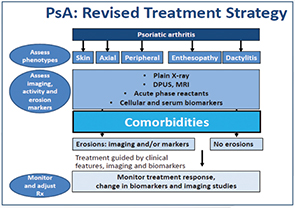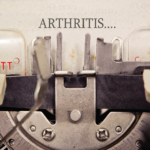BOSTON—The pathogenesis of psoriatic arthritis, its clinical manifestations and ways to diagnosis it, along with a rational approach to treatment, were all discussed during a session on Psoriatic Arthritis: Skin, Entheses and Joints at the ACR/ARHP Annual Meeting in Boston in November 2014.
Aim Higher: Treatment for Psoriasis
Kenneth B. Gordon, MD, professor of dermatology, Northwestern University, Feinberg School of Medicine, Chicago, opened the session with a discussion of current efforts to treat and improve treatment for psoriasis. Opening with a quote from John Updike, who described the humiliation of having psoriasis, Dr. Gordon emphasized the significant impact of this condition on patients’ lives in determining the goals of therapy.
For example, he said that people with psoriasis on both their hands are considered to have a mild case of psoriasis, but he emphasized the significant impact this can have on, for example, professional people who, by etiquette, need to shake hands with their clients. He cited young women with scalp psoriasis as another example of patients who are significantly affected by the disease.
Citing data showing that the No. 1 reason that patients no longer seek treatment for psoriasis is that they’ve given up trying to get sufficient treatment, he highlighted that the goals of treatment often differ between patient and physician and urged physicians to think of psoriasis in the context of the general health of patients. This includes not only improving the primary disease, but also looking at and treating co-morbid diseases (such as frequent depression and cardiovascular disease) and overall emotional and economic needs that can significantly affect patients. For example, he said that the economic impact of psoriasis can be particularly significant for lower income people, a high percentage of whom have severe disease.
As such, he recommends aggressive treatment for treating the skin disease (and not joint disease) in patients with psoriasis. Highlighting new information on the importance of achieving Psoriasis Area and Severity Index (PASI) of at least 90% reduction (PASI90) instead of the current standard measure of 75% reduction (PASI75) on improving the disease, he said that the PASI75 and PASI90 achieved with the current standard therapy with methotrexate is suboptimal.1,2
Other oral medications, such as apremilast, are similar to methotrexate in terms of PASI response, he said, but have a better tolerability that may be needed for some patients.
To provide more optimal treatment, he referred to new information on the pathogenesis of psoriasis that shows the importance of the IL-17 pathway in connecting the inflammatory response and clinical presentation of psoriasis.




